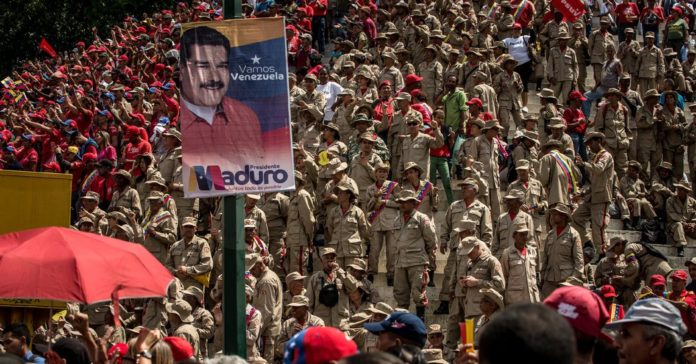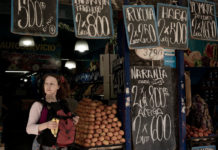CIUDAD GUYANA, Venezuela — Julio Romero emerged from the flag-waving crowd as President Nicolás Maduro stood smiling on a stage, dancing to an election jingle.
Mr. Romero, 42, was in no mood to celebrate. He clutched the colostomy bag he has used since he was shot last September, when armed men stole his taxi and any chance he had of making a living. Though he had managed to attend the rally, Mr. Romero did not consider himself a supporter of the president.
He had come in search of food.
“I came here because I thought they would give me something to eat,” said Mr. Romero, referring to the handouts often seen at government rallies.
Venezuela was once a country whose governing party used elections to speak about transforming society in revolutionary terms. It built homes and clinics and schools for the poor. Its ideas spread throughout the region, influencing leftist leaders throughout Latin America for more than a decade.
But years of mismanagement have scaled back those dreams, if not dismantled them altogether, in an economic collapse that is one of the worst in the Western Hemisphere in modern times.
This election, it seems, is in many ways about food.
Venezuela’s inflation is already the worst in the world and is expected to hit a stunning 13,000 percent this year. Stores are empty and people sift through garbage for scraps. Many people call the country’s malnutrition the “Maduro diet,” laying blame for the gaunt figures that are common sights now on Mr. Maduro.
A large majority of Venezuelans are dependent on the government for subsidized groceries distributed by local councils loyal to the president. Food has even entered the election, potentially controlling the way Venezuelans will vote.
Many people receive their subsidies using a special identity card that is playing a big role in this election. For Sunday’s vote, Venezuelans have been told to present these cards at stations run by Mr. Maduro’s governing party at polling places — so that party organizers can see who has voted and who has not.
“Everyone who has this card must vote,” Mr. Maduro has said at his campaign rallies, directly linking government handouts to voting. “I give and you give.”
Many see his words as wielding food as a tool to buy votes in the campaign — or to intimidate hungry people who might consider voting against him.
“Maduro has put it clearly: It’s an exchange of loyalty,” said Margarita López Maya, a political scientist.
The election is a pivotal moment for Venezuela. The country’s democracy has come under assault since Mr. Maduro won a special election in 2013 after the death of President Hugo Chávez.
The big shift here began in late 2015, when Mr. Maduro’s governing United Socialist Party lost control of the National Assembly. But before the new legislature could be seated, pro-Maduro lawmakers stacked the Supreme Court with loyalists, stifling the opposition’s agenda.
Then in 2017, Mr. Maduro sidelined the legislature altogether, pushing through the creation of a new body, the Constituent Assembly, that had the power to rewrite the Constitution and effectively run the country. Mr. Maduro consolidated his power as the new group took over.
Now comes another major test for the country: a presidential vote that many international observers say has been engineered for Mr. Maduro to win a new term.
Many major international election observers have refused to monitor the vote on the grounds that it will not be fair. Most of the main opposition parties have been disqualified from running and their most popular potential candidates have been jailed or barred from holding office.
Those eligible to run have mostly called for a boycott. The date of the election is even a point of contention: The vote was called six months early, in what Mr. Maduro’s rivals say was an effort to give them little time to prepare for it.
The United States and many countries in the region have said they will not recognize the winner of the election.
“They do whatever they want and put themselves above the law and above the interests of the people,” said Héctor Navarro, who served for years as a minister in the government of Mr. Chávez and is now part of a growing list of former top Chávez officials who have become dissidents while still keeping their distance from the traditional opposition.
“In the history of Venezuela, every government has had its weaknesses and problems: murderous governments, thieving governments, incompetent governments, lazy governments, those have always been around,” Mr. Navarro said. “But all at the same time? That has never happened before, a government with all of those traits.”
It is the government’s inability to feed its people that has stunned Venezuelans the most, even some of Mr. Maduro’s fiercest supporters.
Isabela Romero, a 50-year-old schoolteacher, stood in the crowd of the president’s supporters in Ciudad Guyana, once a growing industrial city whose wealth was fueled by iron, steel and aluminum. Many factories are idle, and lines outside of grocery stores have been endlessly long for years.
Two decades ago, Ms. Romero voted for Mr. Chávez and saw the benefits of his reforms: She received a master’s degree that his government paid for and a parcel of land that had been expropriated, she said.
Now her hopes have changed under Mr. Maduro. “He just needs to find a way to make an economic revolution, so we can eat once again,” she said.
At his rally that day, the president sounded nearly contrite, saying he had made mistakes in the past and had “matured” — a play on words using his last name. He promised big changes to get people to work once again, an “economic revolution” that would give people jobs and opportunities again. Mr. Maduro insists that the country’s problems are the result of an “economic war” waged against it by the United States.
At a separate news conference, Mr. Maduro insisted that he was still a democrat. “Do they really think that people here are so stupid and submissive that they would put up with a dictator?” he said.
For some, the lack of food is just part of the desperation that has made many here receptive to the call for a boycott of the vote.
“People are very dispirited and they aren’t prepared to go out and vote,” said Miriam Bravo, a 40-year-old mother of seven with a 3-month-old baby in the sprawling Petare slum of Caracas, the capital. She said that her husband died in January from cancer, the victim of a health system in a free fall, with medicines scarce or nonexistent and adequate treatment often unavailable.
Ms. Bravo, a seamstress, said that before the crisis she and her husband used to take their children to the beach or to a park near the center of Caracas on weekends. Sometimes, they would treat themselves to a meal at McDonald’s. Now she struggles to put food on the table even twice a day.
“I think that by voting I will just be supporting the government,” Ms. Bravo said. “I don’t think that the election should be carried out in these conditions.”
While many opposition figures have called for a boycott of Sunday’s election, the two main candidates who have defied that appeal to challenge Mr. Maduro are Henri Falcón, a former follower of Mr. Chávez who later joined the opposition, and Javier Bertucci, a wealthy evangelical minister.
The question of abstention has weighed on the opposition, tearing apart what had been a unified front against Mr. Maduro in previous elections. His rivals faced a difficult choice: Participate in an election that many believed was rigged against them, or boycott the vote and assure a victory for Mr. Maduro.
On Thursday, those tensions were laid bare in Caracas outside the headquarters of Venezuela’s intelligence agency, which contains a jail holding about 55 political prisoners, including opposition activists and a prominent opposition politician. The night before, many of those prisoners had begun a protest in which they occupied a section of the jail, sending out text messages and videos. The images showed a prisoner they said had been badly beaten on the orders of guards.
Outside the complex, family members of the prisoners and opposition activists gathered. Mr. Bertucci, the evangelical minister running against Mr. Maduro, showed up in what he said was an effort to draw attention to the prisoners’ plight. But many of those present saw it as a campaign event for an illegitimate election.
“Get out!” they screamed, as he tried to speak to reporters. Someone threw water at him. “Bertucci is Maduro! I ask for democracy!” another shouted.
Mr. Bertucci remained calm. “Calling for abstention is not the way to free them,” he said of the prisoners. “We have to do more than protest. I believe the only weapon is the vote.”
Desireé Rodríguez, a volunteer cook at a Caracas soup kitchen, said that she intended to ignore calls for the boycott and would vote for Mr. Falcón.
Ms. Rodríguez, 33, who has a 10-year-old son, said that before the soup kitchen opened in January, her family was short on food and often ate just twice a day. She recalled counting out the small potatoes she could afford to make sure there were enough for more than one meal, or carefully dividing up a ration of pasta to stretch it across two or more days.
“This is like an epidemic,” she said. “Ask any poor person and they will tell you the same thing.”
In a Caracas slum called La Vega, Iris Hidalgo, 50, struggled with the question of whether to vote on Sunday.
She said that she had always voted for Mr. Chávez and then, in 2013, for Mr. Maduro.
“I regret it now,” she said. “He destroyed the country.”
Nicholas Casey reported from Ciudad Guyana, and William Neuman from Caracas, Venezuela.
Source : Nytimes













